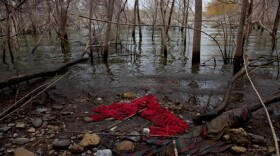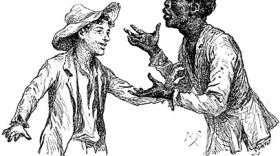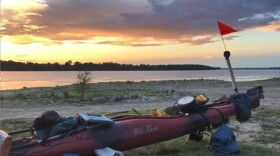-
This is Leslie VonHolten traveling through the High Plains of Kansas, with another HPPR Radio Readers Book Byte.The books we have read so far for our rivers series have explored history and terrain, with the river serving as the path of travel. For Max McCoy’s Elevations, the travel was a deeper understanding of place and self. For Mark Twain, Huck Finn, and Jim, the river represented freedom—freedom from the past, both personal and as a nation desperately in need of moral change.But Francisco Cantu’s memoir, The Line Becomes a River, complicates the role of the river. This time it is the Rio Grande, the highly politicized demarcation between Mexico and the United States.
-
Greta: Hello. Can you tell me about how you came to Dodge City and why you are here?Maria: I came here because I love this country. I came here to see my sister. I was in Mexico and I came crossing the river. The Rio Bravo. It was dangerous. It was hard. But I came here because the life is better than my country. This is a blessed country. I love this country.
-
Hi, I am Marco Macias, a history teacher here at Fort Hays State University. Thank you for tuning in, and welcome to a BookByte of The Line Becomes a River: Dispatches from the Border, a fascinating narrative from Francisco Cantu. In the book, he describes his experiences growing up on the border and then pursuing a career in border patrol for several years. Traversing through the desert, he learns to understand the inhumanity of forcing immigrants across the desert and returns to civilian life. Afterward, he discovers the particularities of family separation as an undocumented friend visits his dying mother and can’t come back after decades of living in the United States.
-
Thank you for joining us on the High Plains Public Radio Station. My name is Jessica Sadler and I am a Science Teacher and STEAM facilitator in Olathe, Kansas. I am here with the other book leaders to discuss Huckleberry Finn by Mark Twain. This piece of classic literature explores the entrapments and desires for freedom that many people still experience today in various ways.
-
This is Nicole English coming to you from the Sociology Department at Fort Hays State University for HPPR's Book-Bytes....This is a discussion of the book, The Adventures of Huckleberry Finn, by Mark Twain, as a picaresque novel (or novela picaresca).
-
Hello, Radio Readers! I’m Jane Holwerda from Dodge City, KS. Welcome to more conversations about “Rivers and Meandering Meanings,” as we wrap up Mark Twain’s Adventures of Huckleberry Finn, that 19th century American novel set on and around the Mississippi River.The final chapters play out a complicated plan devised by Tom Sawyer to help Huck Finn steal Jim back. That Tom Sawyer becomes an agent of change in this novel seems a puzzling plot device. But it is a device in keeping with Twain’s parody of the novels of French author Alexander Dumas, like The Count of Monte Cristo and The Man in the Iron Mask.
-
I’m Hannes Zacharias from Lenexa for High Plains Public Radio, Radio Reader’s Book Club. The book is “The Adventures of Huckleberry Finn” by Mark Twain, the book from which “all modern American literature comes…” said Ernest Hemingway.The story is compelling, but I flow to the setting. The Mississippi river. The river of the 1850’s with its expanding steamboat traffic and flotilla of canoes, boats, rafts and all other manner of watercraft.
-
Hi. I’m Valerie a radio reader from Topeka and I wanted to share my thoughts about our second book which is part of this fall’s Radio Readers theme of “Rivers: Meandering Meanings”, the Adventures of Huckleberry Finn by Mark Twain.I’ve read Twain’s novels Tom Sawyer and the Prince and the Pauper in middle school and his short story the “Jumping Frog of Calaveras County” when I lived in California several years ago. I remember liking Twain quite a bit, but I’d never read Huckleberry Finn.
-
Hello, Radio Readers! I’m Jane Holwerda from Dodge City KS. We’ve been talking about Mark Twain’s The Adventures of Huckleberry Finn. This 19th century American novel is the second in our Fall Book Read: “Rivers and Meandering Meanings.” Set loosely before the Civil War, the central characters are Huckleberry Finn, an11-yr old orphan from what we might call the wrong side of the tracks, and a 30-something fugitive slave. Together, Huck and Jim attempt to flee the laws and mores that restrain them by rafting the Mississippi River.
-
I’m Denise Low reading poems about rivers as part of The Radio Readers Book Club’s 2021 Fall Read Rivers – Meandering Meaning. William Stafford captures the mystery of rivers in his poetry, especially this poem about wintery rivers:Ask Me by William StaffordSome time when the river is ice ask memistakes I have made. Ask me whetherwhat I have done is my life...

Play Live Radio
Next Up:
0:00
0:00
Available On Air Stations










